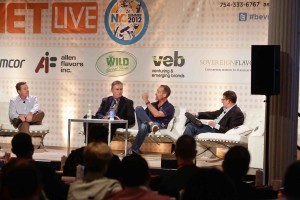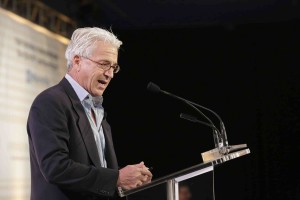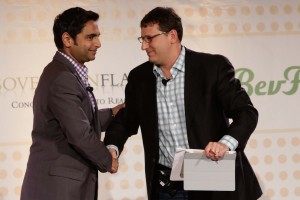Twenty-one different sessions with speakers and panelists. A $10,000 contest. Two days that drew 500 guests.

Looking at the numbers at the seventh incarnation of BevNET Live, which finished up on Tuesday after two days of intense teaching, networking and community building in New York City, however, the event started and ended with the simplest number: one. As in, sell one bottle per day in each convenience store you’re in, and you can slowly build a brand.
That “VPO of one,” introduced in the very first presentation of Day One by former Snapple CEO and current INOV8 Beverage Co. Chairman Mike Weinstein, serendipitously reappeared as part of the last panel of the event’s second day, as Zico founder Mark Rampolla, Polar Beverage CMO Gerry Martin and former Store 24 buyer Andy Steele discussed goals and responsibilities for entrepreneurial brands in new markets.

Of course, there was plenty that took place in between. Following a humorous presentation entitled “I wish I didn’t know now what I didn’t know then,” Weinstein made it clear that for beverage entrepreneurs, huge exits should not be the goal, explaining that multi-million dollar exits like those available to the founders of SoBe and Vitaminwater were as likely as inheriting a fortune from the cousin of a Nigerian dictator.
But that doesn’t mean that worthwhile brands aren’t capable of being built, and much of the content that followed showed how some of the most interesting new beverages in the country are coming to market. A panel of entrepreneurs including Justin Guilbert and Douglas Riboud of Harmless Harvest, Janie Hoffman of Mamma Chia and Danny Stepper of Aloe Gloe discussed ways their organizations have adjusted as their sales have increased, while emphasizing the importance of keeping growing teams focused on brand mission. And while passion is important, Hoffman explained, cultural fit is also the key.
While things are moving fast for the three brands, they agreed that it’s important to say “no” to retailing opportunities that might not fit long term plans for the brand. Stepper called rejecting those seemingly prime opportunities “intelligent loss of sales.”
Stepper’s idea was reflected the next day during a panel on the occasional shortcomings of entrepreneurs; Zevia CEO Paddy Spence, CheriBundi CEO Brian Ross and AquaHydrate CEO John Cochran have all recently taken over the top spot at their companies, and said their long experience heading other ventures showed that the occasional “P&L boost,” as Cochran put it, often distracts from the main business of growing the company.
“It’s easy to get a good product into lots of stores, but if the consumer isn’t ready for it, the brand suffers,” Ross said.

Getting consumers into a mindset that will accept new brands is often the job of a marketing team, and keynote speaker Rohan Oza, the former CMO of Vitaminwater, explained a number of strategies for priming the pump as he described “creative disruption” as a marketing strategy — much like the one he implemented when taking rapper 50 Cent and various sports stars and turning them into Vitaminwater investors and brand acolytes.
Oza also pointed out that a certain amount of timing is required before a brand can activate celebrities as a way of putting it over the top. He said that Vita Coco CEO Mike Kirban (in whose business Oza is an investor) had been extremely patient in building the brand up at street level via a strong sales force before turning to celebrities like Madonna and Rihanna to help “push it to the next level.”
According to Oza, brands that have potential operate in whitespace until they begin to make sense to a broader group of consumers: “Everything is niche until it’s not,” he told the crowd.
Conventional marketing practices had already taken a shot the day before, when CNBC reporter and self-professed beverage fanatic Darren Rovell stopped by to talk to the crowd about some lessons they could take from observing Red Bull’s marketing techniques, which he called “an active case study” in innovative marketing. Rovell told the crowd that rather than just pay athletes to rep the brand — which he called inauthentic — the model should be along the lines of skier Lindsey Vonn, who even has a therapist and personal trainer supplied by Red Bull traveling with her.
“Do you think she ever forgets to mention Red Bull when thinking about her sponsors,” Rovell asked. “A true reciprocal relationship should be the goal.”
Reciprocity can also involve the brand and the retailer, as speaker Mathis Martines of The Fresh Market told the crowd. Describing a system in which the fast-growing natural foods chain will take a chance on a new product in exchange for exclusivity, Martines said, creates a situation where the retailer is able to develop a reputation for always having new and interesting products. As for those products, he added, the retailer could have five or six new beverage types in the next year.
Exclusivity is a good way to get new products into some stores, but trust helps as well — that was the point made by Ralph’s Stores’ Dan Riley, who used his time on stage during the first day of the event to “build relationships before brands.” That model, he said, is one of the reasons that he believes slotting fees — long anathema to entrepreneurs and distributors — may belong to an “old way of doing business.”
It might not be old, but Big Geyser is one of the most well-established companies in the beverage distribution business, and COO Jerry Reda was also quick to point out that the company has relationships that allow brands it carries to gain an advantage in the New York area during his own talk at BevNET Live.
Reda, who paid tribute to the entire Big Geyser team repeatedly during his speech, attempted to teach audience members strategies for launching brands with their new distributors. Launching is kind of a broad term, however, Reda said, indicating that the company still believes it is trying to launch Vitaminwater, even 11 years after it sold its first bottle in the New York area.
“We just finished back-to-back months of double-digit sales increases,” he said of the brand.
For more coverage of BevNET Live, including excerpts from many more panels, breakout sessions, and the New Beverage Showdown, keep an eye on BevNET.com.